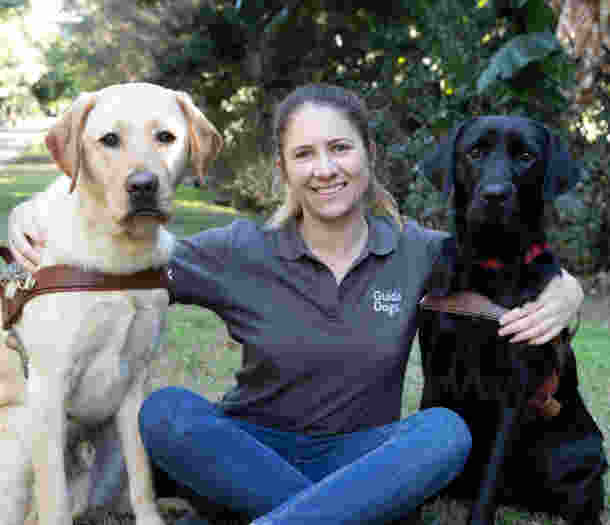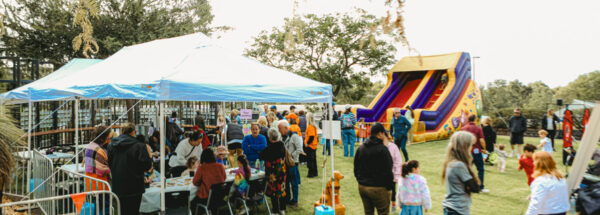On this page:
Life at Guide Dogs Victoria
Working at Guide Dogs Victoria
Orientation and Mobility Specialist
Orientation and Mobility
Orientation and Mobility (O&M) is about ensuring people with low vision or blindness can move around their home and community safely. It’s about people being able to identify and understand where they are (orientation) and safely move around in that location (mobility).
An Orientation and Mobility Specialist (O & M) works with Clients to enhance their orientating and mobility skills. It also includes the teaching or training of those skills which can often take multiple one on one sessions to achieve, and where necessary, how to use a mobility aid or Guide Dog. Programs may include road crossing safety, public transport use, long cane training, concept development and route travel skills. This rewarding career brings great satisfaction, knowing you are helping someone who has low vision or blindness live their life without limits.
To be suitably equipped for an O&M role, you must be tertiary qualified with a degree or post-graduate qualification specialising in Orientation and Mobility.
The University of NSW (UNSW) offers a Graduate Diploma in Orientation and Mobility. Learn more here.
Guide Dog Mobility Instructor
Guide Dog Services
Guide Dog Mobility Instructors (GDMI) are qualified Orientation and Mobility Specialists who extend their learning to Guide Dog mobility to ensure people with low vision or blindness move around their home and community safely with a Guide Dog.
To further qualify as a GDMI, you must undergo an additional two to three year cadetship run by Guide Dogs Victoria.
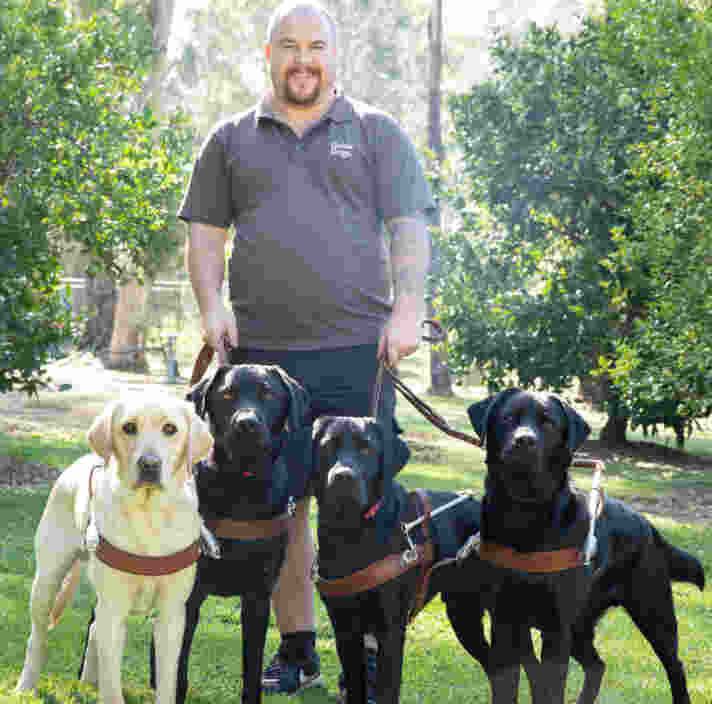
Occupational Therapist
Occupational Therapy
At Guide Dogs, Occupational Therapists assist Clients of all ages and vision levels to develop skills and strategies to complete daily living activities safely and to help maintain or improve their independence using different techniques. This could include the use of low vision aids that can help people with low vision or blindness find ways to function more effectively and confidently. An OT will help a person with low vision or blindness learn new ways to approach:
- Personal Care skills
- Domestic skills around the house
- Meal preparation and cooking
- Tasks encountered while out in the community
- Using technology for communication
- A Client’s home set up
- Carrying put leisure and recreational activities
- Handling money
An Occupational Therapist can also suggest changes to the home and workplace, and training in the use of adaptive equipment.
Occupational Therapy Studies can be undertaken at the following Victorian Institutions:
Guide Dog Trainer
Guide Dog Training
Guide Dog Trainers assess and train our purpose bred dogs to a standard of readiness for allocation to Clients who are blind or have low vision.
Guide Dog Trainer candidates will possess:
- Solid understanding of the principles of canine learning and a commitment to positive reinforcement methodology
- Experience and skills in monitoring and managing the physical and temperamental wellbeing of dogs
- Have a genuine interest and empathy towards animals, particularly dogs, and an understanding of the human/animal bond
- Have an understanding and interest in the goals and needs of our blind and low vision clients
- Have an excellent level of fitness, strength and flexibility to manage the physical demands and requirements of the job
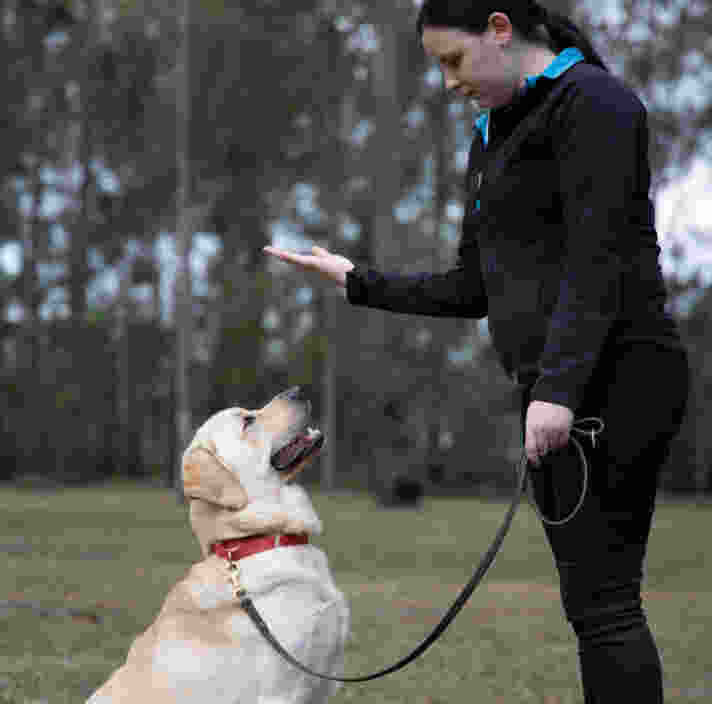
Orthoptist
Orthoptics
An Orthoptist is a healthcare professional in eye health, who is trained to diagnose and treat people with vision and eye disorders.
Through a unique set of skills, orthoptists play a crucial role in the detection, diagnosis and management of eye diseases in both adults and children.
At Guide Dogs, our Orthoptists conduct functional vision assessments and provide low vision aids to assist with reading and accessing information.
Orthoptics studies can be undertaken at the following Victorian Institutions:
Assistive Technologist
Assistive Technology
Assistive Technologists provide technology training to allow people to use adaptive technology to access information.
At Guide Dogs, our Assistive Technologists help Clients learn how to use assistive products to help maintain or improve an individual’s functioning relating to their vision loss. Some of these items include braille, screen readers, magnifiers, key board navigation and canes. This in turn enhances a Client’s health, well-being, inclusion and participation in everyday life.
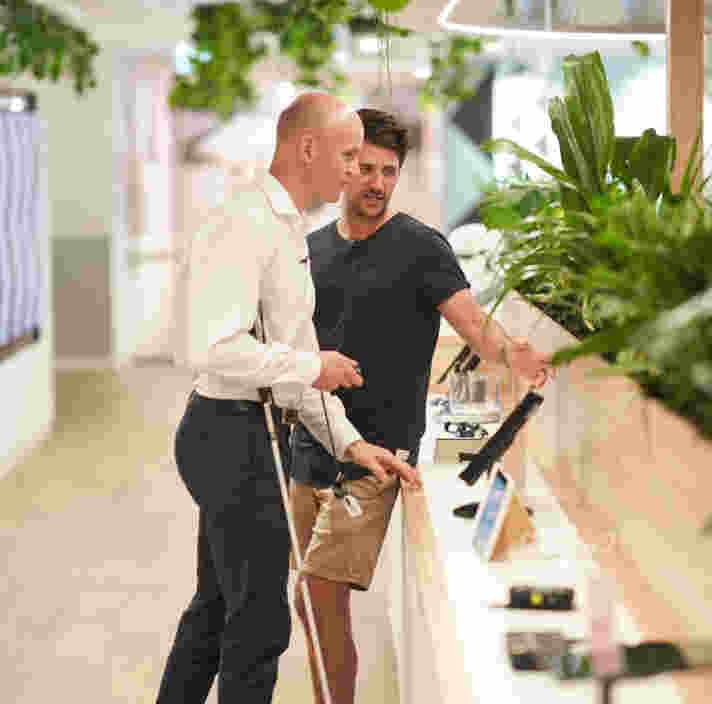
Client Support Coordinator
Client Support Coordination
At Guide Dogs, our Client Support Coordinators assist Clients to access the NDIS scheme and support them to access different service providers. Our Support Coordinators are trained professionals who put the needs of the Client first and will partner with them to understand their unique goals and how to navigate the NDIS to ensure they can be achieved.
You can work as a Support Coordinator without formal qualifications, however employers may prefer candidates with a qualification in disability, community services, mental health, social work or allied health.
- Complete a relevant vocational qualification such as a Certificate III in Individual Support (CHC33015), Certificate IV in Disability (CHC43115) or Diploma of Community Services (CHC52015)
- Ensure you have the relevant checks such as a Working with Children Check, Police Check and NDIS Worker Screening Check. Some employers may also prefer you to have a driver’s licence and access to a vehicle
- Consider completing a degree to broaden your career options. This could be a Bachelor of Social Work or Bachelor of Human Services.
- To gain experience in the industry and to boost your resume, you can also volunteer in Social Support or as a companion to those in need.
Early Childhood Specialist
Early Childhood Services
Early Childhood Specialists support parents with their child who has vision loss. They assist parents to understand their child’s vision and develop skills/strategies to allow their children to participate/access the world around them.
At Guide Dogs Victoria, we believe that every child living with blindness or low vision should be able to access the same advantages of early childhood education as their peers. That’s why we have developed the Guide Dogs Victoria Early Childhood services. We provide a family-centred approach to support the developmental milestones in children birth to six years of age (inclusive) who have been diagnosed with low vision.
Early Childhood Studies can be undertaken at the following Victorian institutions:
- Swinburne University
- La Trobe University
- Melbourne University
- Various TAFE courses

Ready to continue?
Seems like you have filled this form earlier. Let’s pick up where you left off.
